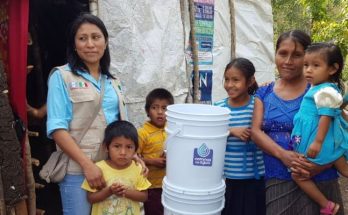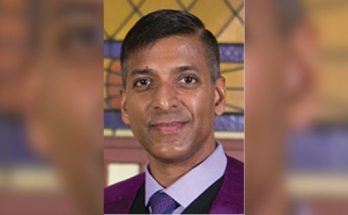By Jesús Aguado
After living in San Miguel for nine years, Chris McCaskill and her husband Rex moved away a few weeks ago. However, thousands of people surely will remember her because her initiative distributed more than seven thousand free face masks.
But who is Chris McCaskill? She was born in Wisconsin, raised in Michigan, and earned a Master`s Degree in Social Welfare Administration. For over 30 years she worked more than 50 hours a week in Austin, Texas, on a variety of public policy analysis projects. She served as Chief of Staff for a Texas State Senator and headed analysis projects for the legislative agency, the Texas Sunset Advisory Commission. She also held a temporary consulting position on Bill Clinton and Al Gore’s Reinventing Government project in Washington, DC.
We interviewed Chris to learn why she came to San Miguel, and in the end why she had to leave.
Jesús Aguado: How did you find San Miguel, and what brought you here?
Chris McCaskill: We were drawn to San Miguel after reading an article in an AARP magazine where the city was listed as one of the ten best foreign places to retire. Compared to other lovely countries such as France and Portugal, San Miguel won out because of its relative proximity to Texas, the attractive cost of living, the moderate sunny climate, and the fascinating, varied backgrounds of both expatriates and Mexican locals. I wanted to be in a Spanish-speaking country.
JA: In 30 words or less, explain your life before this city
CM: We lived in a comfortable subdivision in Austin where the many requirements of our jobs limited our social activities. It wasn’t unusual to work more than 50 hours a week, a huge contrast to the many social and intellectual options available in SMA.
JA: What is the most amazing experience you had in town?
CM: I loved accompanying some fellow Rotarians to an outlying campo’s beekeeping project where the residents maintained the beehives and produced honey. We also saw how the Rotary Club was assisting this community in constructing composting toilets—a project that greatly helped citizens who otherwise lacked sewage systems and other sanitary services. The generosity of the community was amazing, as the residents served us a delicious homemade meal during our visit. We took some free hand-sewn face masks to the children of the community, who enjoyed choosing from among the colorful stylish patterns.
JA: What was the most important phrase or saying you learned from the Mexicans around you? Did it mark you? How?
CM: I studied Spanish with a passion. I always enjoyed being able to thank a compassionate citizen with the phrase, “muy amable.” In two words, this phrase enables us to respect the kindness and generosity of the people around us.
JA: How did Mask4U you begin?
CM: As a passionate quilter, with many friends who also enjoy sewing, the idea of making masks to keep our citizens healthy during the pandemic arose very early. So many people donated fabric and helped us distribute masks, and we quickly met many Mexican seamstresses who really needed paid work because their usual work had declined significantly. Local volunteers would cut the fabric using standard patterns. We’d pass on “kits” to the seamstresses, and paid them for each mask they made. In an 18-month period, we were able to donate over 7,000 masks to individuals and charitable organizations.
JA: Why did you leave town?
CM: Rex and I moved back to Texas for “health reasons”—to enable Rex to use his US health insurance for necessary surgeries and medical procedures. We also have two adult children and a nephew who live there.
JA: You are still attached to San Miguel. If you could, would you come back?
CM: Without a doubt, we would return to reunite with our dear friends, and to partake of the joyous camaraderie that one finds everywhere. The last time my youngest son visited me in San Miguel, he met a beautiful young woman who lives in SMA but is here in Austin for a couple of weeks to visit him. I think that relationship will spark future visits to SMA. My older son and his now-wife fell in love with SMA when they visited us the first time six years ago, and as a result they had their wedding in SMA. We will visit often—as circumstances allow.
JA: If San Miguel could have an expat in office—city councilor, mayor, city attorney—what would that person have to do to improve the lives of locals?
CM: It is so important to assess their NEEDS. I’d expect any office-holder to be in very close touch with the people—whether through town hall meetings or other means. We must never assume to tell them what they need, but rather to listen. Two critical areas of focus—eliminating hunger and improving education.
JA: Did you visit rural San Miguel? What did you learn? How did that change the vision you had of the city?
CM: Yes, we visited many rural areas. We were touched by the challenges many face to have decent housing, often lacking enough space, roofs, windows. It’s also sad to see the proliferation of homeless animals. The rural areas are strikingly beautiful despite the shortage of essential resources.
JA: Any advice for locals?
CM: Remember that those of us who were raised outside of Mexico have great respect for the close family ties we see so often. Cherish those relationships and stay close.
JA: And advice for visitors? CM: Get to know the non-profit services available in SMA and serve wherever you can. Try not to isolate within your expat community. Study Spanish!




